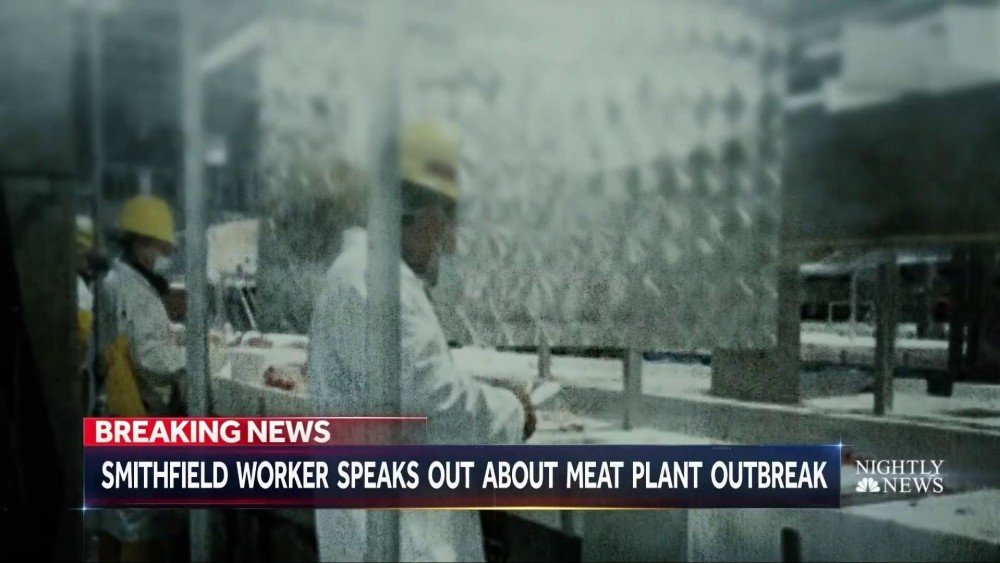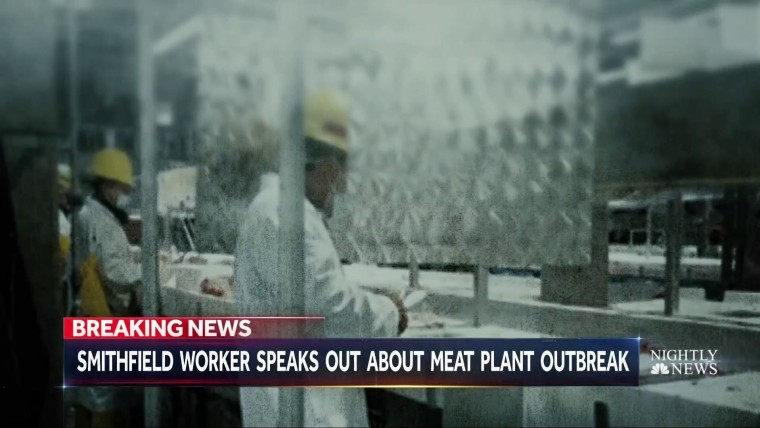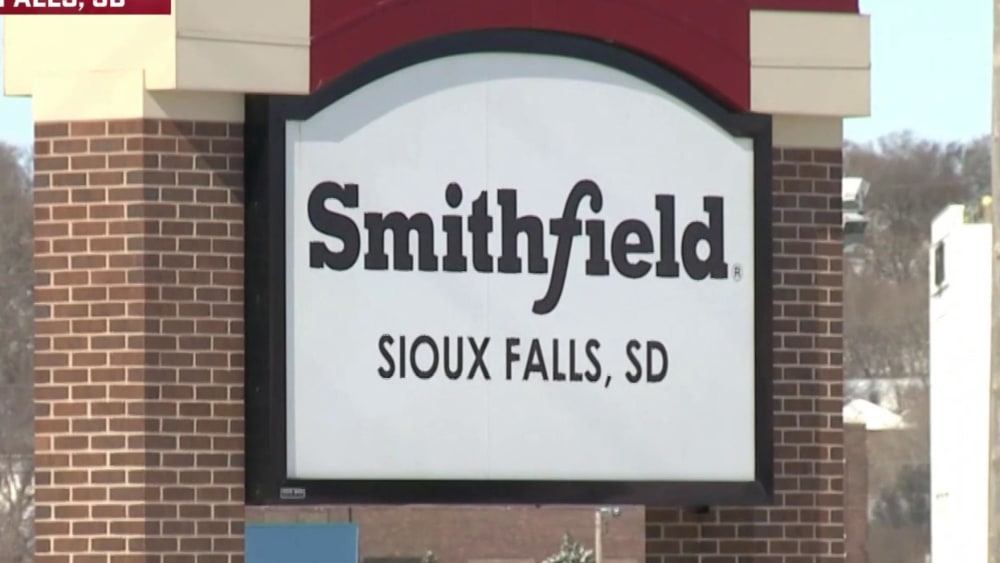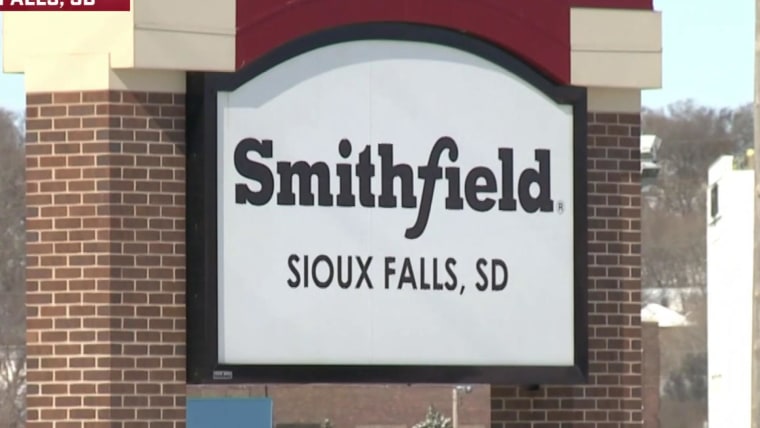Language barriers helped turn Smithfield Foods meat plant into COVID-19 hotspot
Forty different languages are spoken at the South Dakota pork processing plant that has become a coronavirus hot spot, but workers who showed symptoms were sent home with informational packets that were written only in English, federal investigators revealed Thursday.
That failure to communicate may be part of the reason why 783 workers at Smithfield Foods in Sioux Falls have tested positive and two have died from COVID-19, the federal Centers for Disease Control and Prevention said in a 15-page memo.
“We understand that if an employee was found to have a fever or symptoms consistent with COVID-19, they were given an informational packet (in English) and instructed to return home,” the CDC report stated.
But “plant management reported that there were approximately 40 different languages spoken by employees at the plant.”
Inside meat processing plant linked to nearly 900 coronavirus cases
APRIL 20, 202002:14
While English is one of “the top 10 languages,” so too are “Spanish, Kunama, Swahili, Nepali, Tigrinya, Amharic, French, Oromo and Vietnamese.”
The language barrier also stymied the CDC team of veterinary epidemiologists, industrial hygienists and others who toured the plant on April 16 and 17.
“Our team was unable to identify important demographic information about this workforce, limiting our ability to understand the diversity of the employees,” the CDC report said.
“We were also unable to obtain information about the workstations of confirmed positive cases. This type of information could provide a better understanding of what workplace factors contributed to the spread of COVID-19 among employees.”
The first plant worker tested positive on March 24, but the plant was not shut down until April 14. But before that happened, the CDC reported that workers were promised extra money if they showed up for work during the pandemic.
“Additionally we learned of a ‘responsibility bonus’ of $500 being offered to employees who did not miss time (e.g. were not late or sick) during the time period of April 1, 2020 through May 1, 2020,” the report stated.
There was no immediate response from Smithfield’s CEO, Kenneth Sullivan, to the findings. The company’s chief spokesperson, Keira Lombardo, said in a statement: “We will thoroughly and carefully examine the report point by point and respond in full once our assessment is complete.”
Are meat workers facing choice between health and livelihood?
APRIL 18, 202007:37
Smithfield Foods is one of the biggest clusters of coronavirus cases in the country and has put an unwanted spotlight on Gov. Kristi Noem, a Republican who has been criticized for not issuing a shelter-at-home order in a state where as of Thursday nine deaths and 1,956 cases have been reported.
Noem has, however, urged residents to practice social distancing and avoid large gatherings.
“I want to thank Vice President Pence, Secretary of Agriculture Perdue, and the CDC for prioritizing the situation at Smithfield Foods in Sioux Falls,” Noem said in a statement. “Their partnership has been critical to the work that we’ve done to get this cluster under control and safeguard the health of this workforce.”
Noem also pledged that the South Dakota health department “will continue to work with Smithfield and offer any assistance we can to help them implement these CDC recommendations, so they can safely reopen this plant as soon as possible.”
Later, at a press conference, Noem said she is “anticipating” Smithfield will act on the CDC’s recommendations.
Meanwhile, Tyson Foods Inc. announced it was closing a meat processing plant in Pasco, Washington that produces enough beef in one day to feed four million people. The company has already closed two pork processing plants because of the coronavirus.
“We’re working with local health officials to bring the plant back to full operation as soon as we believe it to be safe,” Steve Stouffer, head of Tyson Fresh Meats, said in a statement.
Experts warned that all these closures could result in meat shortages.
“Meat shortages will be occurring two weeks from now in the retail outlets,” Dennis Smith, a senior account executive at Archer Financial Services, told Bloomberg News.
More than 5,000 meat and food processing workers have been infected of exposed to COVID-19 and 13 have died since the pandemic struck, the United Food and Commercial Workers International Union reported Thursday.
At Smithfield Foods in South Dakota, the CDC report suggested 11 recommendations for the Smithfield plant in Sioux Falls, including speeding up the installation of plexiglass barriers on production lines, adding 100 more time clocks to prevent bottlenecks, boosting the number of hand sanitizer stations to 3,500 so there is at least one per worker, and designating staffers to roam the floor and provide hand sanitizer to workers on the line every 30 minutes.
“A combination of control measures with ongoing education and training will be useful in reducing or eliminating transmission in the workplace,” the report said. “These recommendations are intended for this specific Smithfield plant, but broader interim recommendations for meat and poultry processing industries are in development.”
The South Dakota Department of Health is requiring the company to submit a plan of action before it reopens and expects it to follow the CDC recommendations.
“For each recommendation, please indicate a timeframe for implementation,” Health Department secretary Kim Malsam-Rysdon and state epidemiologist Dr. Joshua Clayton wrote in a letter dated Thursday to Sullivan.
”If a recommendation cannot be implemented or a different solution is proposed, please provide the justification,” it said.
They also asked for a date when the plant, which processes fresh pork, bacon, hot dogs, deli and smoked meats, will re-open.
Smithfield is owned by Hong Kong-based WH Group, which is the largest pork processor in the world and which also operates plants in Wisconsin, Missouri and Pennsylvania. All the U.S. plants were closed after workers there tested positive for the coronavirus
Originally Published on MSNBC




